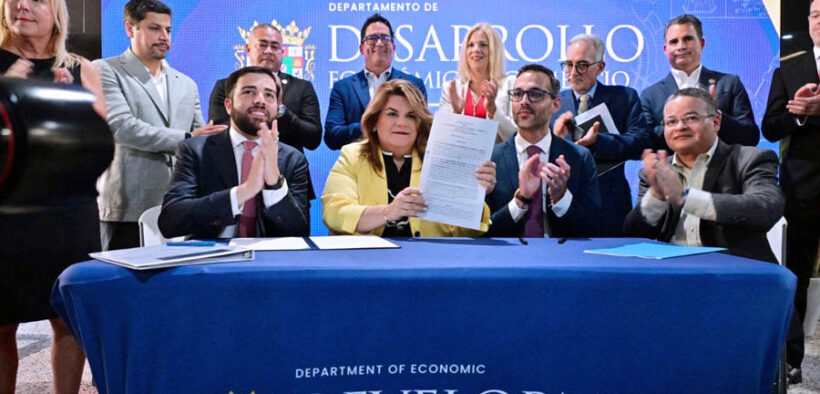Puerto Rico gov’t launches sweeping permitting system reform

The government of Puerto Rico has announced a sweeping reform of its permitting system designed to ease the process of starting and expanding businesses on the island.
The package of structural, technological and regulatory changes — scheduled to take effect July 1 — is backed by both public officials and the private sector, including the Puerto Rico Chamber of Commerce (CofC) and the United Retailers Association (CUD, in Spanish).
Gov. Jenniffer González, alongside Sebastián Negrón-Reichard, secretary of the Department of Economic Development and Commerce (DDEC, in Spanish), and Norberto Almodóvar, deputy secretary of the Puerto Rico Permit Management Office (OGPe, in Spanish), unveiled the reform during a news conference as part of a broader effort to make Puerto Rico a more competitive environment for doing business.
“Puerto Rico needs a permitting system that matches the talent, initiative and business acumen of our people,” said González. “We’re leaving behind the model of punitive bureaucracy to make way for a modern, agile and responsible structure, where the state does its part and businesses can focus on growth.”
Key components of the reform include the automation of expiration notifications for inspections and licenses, the assignment of a unique permit transaction number to centralize case tracking and the elimination of inspections for low-risk home office spaces.
Businesses will now receive automated reminders 45, 30, 15 and one day before permits or inspections expire, eliminating the need to initiate new procedures annually.
A significant shift is the transfer of responsibility for inspections to the central government. Under the new model, agencies have 90 days to complete inspections. If they fail to do so, the business will not be charged, reversing what officials called a “prepaid without service” practice.
The government will also improve how it checks the qualifications of authorized professionals and inspectors and will standardize permit paperwork by automatically issuing certificates once procedures are completed.
“This reform is not an isolated action,” said Negrón-Reichard. “It’s about redesigning what has failed. These measures correct distortions, eliminate redundancies and, above all, restore trust between the state and the productive sector.”
As part of the reform, the DDEC and the Department of Health will collaborate to shift low-risk inspections to OGPe, allowing the Health Department to focus on higher-risk cases. Officials also confirmed that an updated Regulation of Professional Practice will be introduced for the first time since 2014.
An orientation phase for businesses, interagency staff and citizens will take place throughout June to help with the transition. The reform draws on feedback from more than 880 business owners who participated in a user experience survey conducted through the Single Business Portal.
Private sector leaders hail ‘structural change’
Private sector leaders have welcomed the measures, with the CofC expressing full support for the reforms and their potential to reduce administrative obstacles.
“These reforms reflect a paradigm shift in which the [central government] assumes greater responsibility for administrative processes,” said CofC President Luis Pizarro.
“At the Chamber of Commerce, we reaffirm our commitment to collaborating in the implementation and dissemination of these measures, which will undoubtedly strengthen formalization, reduce barriers to entrepreneurship and make our commercial ecosystem more competitive,” he said.
The CofC emphasized that measures like these foster “a climate of certainty, agility and collaboration between the private sector and the government.”
Meanwhile, CUD President Ramón Barquín reacted with “cautious optimism” about the changes, saying that for more than a year, the trade group had insisted that the old permit system “represented one of the biggest obstacles to the island’s economic development.”
Barquín said the announced measures — such as the automation of notifications, the elimination of unnecessary inspections, the creation of a single number for procedures and the redistribution of inspection responsibilities — “reflect an important structural change. However, this transformation must be accompanied by a cultural shift within the government apparatus.”
“Reform is worthless if there is no real commitment to service from those who must implement it. This is a historic opportunity for the government to demonstrate that it can be a facilitator, not an obstacle, to business activity. Puerto Rico needs a streamlined, fair and transparent system that allows businesses to focus on growing and contributing to the island,” he said.












